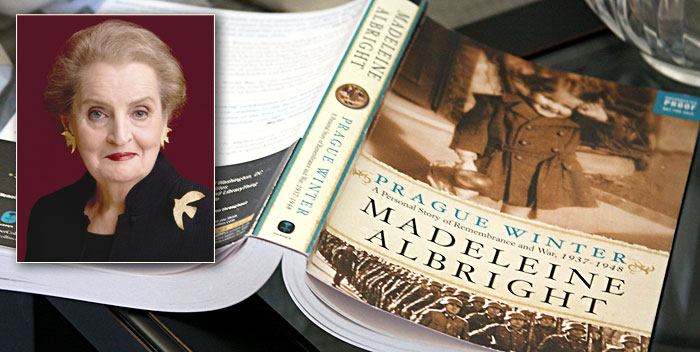Imagine the discovery in the sixth decade of your life that your parents were Jewish, that more than twenty of your relatives died in the Holocaust, that the trajectory of your life story, indeed your very survival, was the result of complex moral choices which your parents were called upon to make.
In the hands of former Secretary of State Madeleine Albright, a family history takes on the spectrum of world history as events unfold in her recollection of Prague Winter: A Personal Story of Remembrance and War, 1937-1948. Drawing on her earliest memories, letters and written reflections from her parents, and brilliant research, Albright takes the reader from the Czechoslovakia of her childhood – “a land of magic, marionettes, Franz Kafka and Good King Wenceslas” – through the tumultuous years of Nazi occupation, the rise of fascism and the onset of the Cold War.

Through Albright’s lens, we follow an intensely personal, yet global story. We see intimate portraits of the war years in London where her parents escaped after the Nazi invasion in 1939; we follow refugees to the prison ghetto of Terezin where her grandparents perished. Albright also brings to light the story of millions of ordinary citizens throughout Europe, driven from their homes and forced by their decisions, large and small into new roles: as leaders, followers, freedom fighters, victims, killers.
“Why do we make the choices we do?”
Albright asks,“What separates us from the world we have and the kind of ethical universe (we like to envision)? What prompts one person to act boldly in a moment of crisis and a second to seek shelter in the crowd? Why do some people become stronger in the face of adversity, while others quickly lose heart? What separates the bully from the protector? Is it education, spiritual belief, our parents, our friends, the circumstances of our birth, traumatic events, or more likely some combination that spells the difference?”
History as memoir
In Prague Winter we also have a foreshadowing of the world leader Madeleine K. Albright was to become as 64th Secretary of State of the United States. Serving from 1997 to 2001, she was the first woman to hold that position, which she assumed after four years as U.S. Ambassador to the United Nations. During her tenure, Dr. Albright was known for her strong commitment to democracy, arms control, human rights and peace in the Middle East, Africa and other regions of conflict. She played a lead role in forging America’s successful response to terror and ethnic cleansing in Kosovo, and was a forceful advocate of bringing war criminals to justice.
Since leaving office, Dr. Albright has written three New York Times bestsellers. Her autobiography, Madam Secretary: A Memoir, was published in 2003. A second book, The Mighty and the Almighty: Reflections on America, God, and World Affairs, entered bookstores in 2006. Memo to the President: How We Can Restore America’s Reputation and Leadership was published in 2008.




